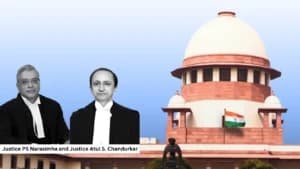In a key decision, the Allahabad High Court has dismissed a plea filed on behalf of Deity-Shriji Radha Rani Vrishbhanu Kumari Vrindavani (Goddess Radha) in the ongoing Krishna Janmabhoomi–Shahi Idgah mosque dispute. The plea aimed to include her as a party in one of the 18 related suits pending before the Court.
The application was submitted by Advocate Reena N. Singh as Radha Rani’s 'next friend.' It argued that she is the spiritual and legal consort of Sri Bhagwan Krishna Lala Virajman, the main plaintiff in suit number 7. The plea claimed that both deities jointly own the 13.37-acre disputed property in Mathura, where the birthplace of Lord Krishna is believed to be located.
Read Also:- WhatsApp Challenges Consumer Complaint Maintainability Before Allahabad High Court
The plea relied on scriptures like the Brahma Vaivarta Purana, Narada Pancharatra Samhita, and Garga Samhita, which describe Radha as Krishna's soul and feminine form.
"The applicant is the soul and consort of Sri Krishna and jointly worshipped with him. Therefore, she must be impleaded for full justice," the plea stated.
However, Justice Ram Manohar Narayan Mishra rejected the impleadment request. The Court noted that the claim was primarily based on Pauranic texts, which are considered narrative in nature and not admissible as legal proof.
Read Also:- Supreme Court Dismisses Vidarbha Hockey Association's Appeal Against Cancellation of Hockey India Membership
“Pauranic illustrations are generally considered hearsay evidence in legal context. They are narrative depictions, not direct observations or testimony,” the Court observed.
The judge stated that the applicant failed to provide concrete legal evidence or any binding precedent proving her right in the disputed property. The Court ruled that Radha Rani is neither a necessary nor a proper party in the suit.
"There is no averment that a temple of Radha Rani ever existed at the disputed site," the Court highlighted.
Read Also:- Supreme Court Directs Recount of Supreme Court Bar Association Election Votes Amid Complaints
The plaintiffs in suit no. 7 claim that the Shahi Idgah Mosque, situated at Katra Keshav Dev, was built during Mughal emperor Aurangzeb’s rule after demolishing a Hindu temple marking Krishna’s birthplace. They seek the mosque’s removal and restoration of the temple.
The defense argued that Radha Rani's plea contradicts the existing plaint. They stated that the suit concerns Krishna’s birthplace alone and does not require Radha Rani’s involvement. The High Court agreed.
Read Also:- Supreme Court Orders Status Quo On Bhushan Steel Liquidation To Allow JSW To File Review Petition
Still, the Court noted that if credible evidence emerges later proving joint ownership, the question of impleadment may be reconsidered.
"If, in future, the applicant presents valid proof of joint ownership, the matter may be revisited at the appropriate stage," the Court mentioned.
This dispute has a long and complex history. In 1968, a compromise agreement was reached between the temple trust and the mosque trust, allowing both religious structures to function side by side. That agreement is now under legal challenge for being allegedly fraudulent.
In May 2023, the High Court took over all pending suits related to the dispute from the Mathura Court. This move was challenged in the Supreme Court by the mosque committee and the Uttar Pradesh Sunni Waqf Board. In late 2023 and early 2024, conflicting court orders were issued regarding the inspection of the mosque premises, eventually stayed by the Supreme Court.
The Krishna Janmabhoomi case continues to draw national attention, balancing matters of law, faith, and historical legacy.















